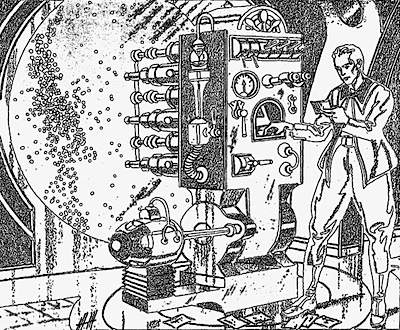Science Fiction
Dictionary
A B C D E F G H I J K L M N O P Q R S T U V W X Y Z
Starshade Will Help Space Telescope To Search For Exoplanets

A starshade would accompany a future space telescope and block the light of an individual star to enhance the study of exoplanets orbiting that star.
A future starshade mission would involve two spacecraft. One would be a space telescope on the hunt for planets orbiting stars outside of our solar system. The other spacecraft would fly some 25,000 miles (40,000 kilometers) in front of it, carrying a large, flat shade. The shade would unfurl like a blooming flower — complete with "petals" — and block the light from a star, allowing the telescope to get a clearer glimpse of any orbiting planets. But it would work only if the two spacecraft were to stay, despite the great distance between them, aligned to within 3 feet (1 meter) of each other. Any more, and starlight would leak around the starshade into the telescope's view and overwhelm faint exoplanets.(Via NASA: Starshade Would Take Formation Flying to Extremes.)
In his thrilling 1936 story Cosmic Quest, Golden Age phenom Edmond Hamilton created an elaborate device to search for habitable planets:
And each mechanical eye, when it found planetary systems in its field, automatically shifted upon them a higher powered telespectroscope which recorded on permanent film the size, mean temperature and atmospheric conditions of these worlds.
(The telespectroscope recorded the conditions of these other worlds)(Read more about the telespectroscope)
Speaking of Thrilling Wonder Stories, take a look at these real life wonder stories of the search for habitable exoplanets:
- Looking For Earth-Like Worlds With Nulling Interferometry
- Europe's Cheops To Look For Habitable Planets
- Automated Planet Finder Telescope Starts The Hunt
- NASA’s Transiting Exoplanet Survey Satellite (TESS) Looks Nearby
- Confirm 100 Exoplanets At Once! (With Video)
- Caltech's ET Laboratory Looks For New Earths
- Rapid Automated Search For Habitable Planets Needed
- Espresso Telescope Searches For Exoplanets
Scroll down for more stories in the same category. (Story submitted 6/7/2019)
Follow this kind of news @Technovelgy.| Email | RSS | Blog It | Stumble | del.icio.us | Digg | Reddit |
Would
you like to contribute a story tip?
It's easy:
Get the URL of the story, and the related sf author, and add
it here.
Comment/Join discussion ( 0 )
Related News Stories - (" Space Tech ")
The New Habitable Zones Include Asimov's Ribbon Worlds
'...there's a narrow belt where the climate is moderate.' - Harl Vincent, 1931.
Will Space Stations Have Large Interior Spaces Again?
'They filed clumsily into the battleroom, like children in a swimming pool for the first time, clinging to the handholds along the side.' - Orson Scott Card, 1985.
Reflect Orbital Offers 'Sunlight on Demand' And Light Pollution
'I don't have to tell you about the seven two-mile-diameter orbital mirrors...'
Chrysalis Generation Ship to Alpha Centauri
'This was their world, their planet —
this swift-traveling, yet seemingly moveless vessel.' - Nat Schachner, 1934
Technovelgy (that's tech-novel-gee!) is devoted to the creative science inventions and ideas of sf authors. Look for the Invention Category that interests you, the Glossary, the Invention Timeline, or see what's New.
Science Fiction
Timeline
1600-1899
1900-1939
1940's 1950's
1960's 1970's
1980's 1990's
2000's 2010's
Current News
The New Habitable Zones Include Asimov's Ribbon Worlds
'...there's a narrow belt where the climate is moderate.'
Can One Robot Do Many Tasks?
'... with the Master-operator all you have to do is push one! A remarkable achievement!'
Atlas Robot Makes Uncomfortable Movements
'Not like me. A T-1000, advanced prototype. A mimetic poly-alloy. Liquid metal.'
Boring Company Drills Asimov's Single Vehicle Tunnels
'It was riddled with holes that were the mouths of tunnels.'
Humanoid Robots Tickle The Ivories
'The massive feet working the pedals, arms and hands flashing and glinting...'
A Remarkable Coincidence
'There is a philosophical problem of some difficulty here...'
Cortex 1 - Today A Warehouse, Tomorrow A Calculator Planet
'There were cubic miles of it, and it glistened like a silvery Christmas tree...'
Perching Ambush Drones
'On the chest of drawers something was perched.'
Leader-Follower Autonomous Vehicle Technology
'Jason had been guiding the caravan of cars as usual...'
Golf Ball Test Robot Wears Them Out
"The robot solemnly hit a ball against the wall, picked it up and teed it, hit it again, over and again...'
Boring Company Vegas Loop Like Asimov Said
'There was a wall ahead... It was riddled with holes that were the mouths of tunnels.'
Rigid Metallic Clothing From Science Fiction To You
'...support the interior human structure against Jupiter’s pull.'
Is The Seattle Ultrasonics C-200 A Heinlein Vibroblade?
'It ain't a vibroblade. It's steel. Messy.'
Roborock Saros Z70 Is A Robot Vacuum With An Arm
'Anything larger than a BB shot it picked up and placed in a tray...'
A Beautiful Visualization Of Compact Food
'The German chemists have discovered how to supply the needed elements in compact, undiluted form...'
Bone-Building Drug Evenity Approved
'Compounds devised by the biochemists for the rapid building of bone...'

